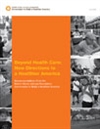Surrogate decision makers for dementia patients often opt for feeding tubes without having realistic expectations about outcomes, according to a small prospective survey study.
The single-center survey of almost 40 surrogates found that most expected improvements in function or overall condition in dementia patients after placement of a percutaneous endoscopically-inserted gastrostomy tube (10% and 50%, respectively), Jeffrey T. Berger, MD, of Winthrop University Hospital in Mineola, N.Y., and colleagues reported.
But despite their frequent use in practice, feeding tubes for dementia patients haven't been shown to improve functional status, nutritional status, or mortality, Berger and his co-authors noted in the Jan. 24 issue of the
Archives of Internal Medicine.
Action Points
- Point out that the study shows that surrogates' knowledge of PEG was very limited, the risk of aspiration was underrepresented, and the likelihood of improved conditions for dementia patients was overrepresented.
"Decisions for PEG [percutaneous endoscopic gastronomy] may reflect an emotional response to avoid 'starvation,'" they wrote in the paper. "The personal, nonevidence-based views of many health professionals about tube feeding for cases of dementia may also contribute to PEG misuse."
Another problem highlighted by the researchers was the very limited knowledge about tube feeding among the surrogate decision makers.
Their study included all 39 individuals who provided consent for percutaneous endoscopic gastronomy for inpatients with the most advanced stage of dementia (stage 7) at a single center over an undisclosed period of time.
A questionnaire completed within one week of feeding tube placement showed that the surrogates thought they had been provided with at least adequate information on potential benefits (58% adequate, 40% very complete) and harms (65% adequate, 33% very complete) of the procedure for the patient.
Specific benefits they recalled were improved nutrition (97%), strength (28%), healing (13%), and maintenance of condition (26%). Specific harms remembered from the consent process discussion were bleeding (72%), infection (69%), perforation (59%), and aspiration (3%).
This low rate of recall for aspiration suggested that the risk was "vastly underrepresented" whereas the likelihood of improved condition was overrepresented with only 13% of the surrogates expecting a decline in overall condition, Berger's group pointed out.
The basis of the decision to consent to gastric tube placement was most often the perception that it would serve the patient's best interests (56%).
"However, objective data does not support such expectation of benefit," Berger and colleagues warned in the paper.
Other surrogates made their decision based on inferred wishes of the patient (33%) or knowing the patient's explicit wishes (10%).
Although 43% of the dementia patients had previously executed an advance directive (17 of 39), the surrogates for 25% overall (10 of 39) said they would go against the patient's expressed preference to consent to tube feeding.
Over time, though, satisfaction with the decision to put in a gastric feeding tube waned (P<0.001).
A second round of questionnaires about two months after placement showed that fewer surrogates would make the same decision if they had an opportunity to do so again (P=0.001) and fewer would want gastric feeding themselves in the same situation (53% versus 70% on the first round, P=0.001).
"These data underscore the need for a more robust process for PEG consent," Berger and co-authors concluded in their Archives paper.
They advocated verifying what surrogates know about gastric tube feeding to ensure realistic expectations -- and perhaps the use of decision support tools, such as standardized, multimedia education.
"Because feeding, orally or medically, carries great symbolic and emotional weight for surrogates, psychosocial supports and palliative care resources should also be integrated into the consent process," they added.
 1600 times (data from ISI Web of Science). In recent years, the Statistical Update has undergone some major changes with the addition of new chapters and major updates across multiple areas. For this year's edition, the Statistics Committee, which produces the document for the AHA, updated all of the current chapters with the most recent nationally representative data and inclusion of relevant articles from the literature over the past year and added a new chapter detailing how family history and genetics play a role in cardiovascular disease (CVD) risk. Also, the 2011 Statistical Update is a major source for monitoring both cardiovascular health and disease in the population, with a focus on progress toward achievement of the AHA's 2020 Impact Goals. Below are a few highlights from this year's Update./.../
1600 times (data from ISI Web of Science). In recent years, the Statistical Update has undergone some major changes with the addition of new chapters and major updates across multiple areas. For this year's edition, the Statistics Committee, which produces the document for the AHA, updated all of the current chapters with the most recent nationally representative data and inclusion of relevant articles from the literature over the past year and added a new chapter detailing how family history and genetics play a role in cardiovascular disease (CVD) risk. Also, the 2011 Statistical Update is a major source for monitoring both cardiovascular health and disease in the population, with a focus on progress toward achievement of the AHA's 2020 Impact Goals. Below are a few highlights from this year's Update./.../ Em 4 de fevereiro será celebrado o "Dia Mundial do Câncer". Em 2011 a União Internacional para o Controle do Câncer (UICC) e organizações parceiras farão campanhas em todo o mundo para alertar sobre essa doença que causa milhões de mortes a cada ano, muitas das quais poderiam ser prevenidas.
Em 4 de fevereiro será celebrado o "Dia Mundial do Câncer". Em 2011 a União Internacional para o Controle do Câncer (UICC) e organizações parceiras farão campanhas em todo o mundo para alertar sobre essa doença que causa milhões de mortes a cada ano, muitas das quais poderiam ser prevenidas.








